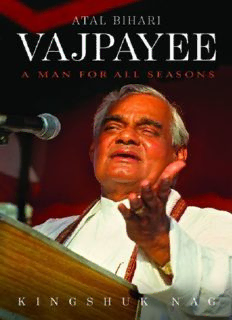
Atal Bihari Vajpayee: A Man for All Seasons PDF
Preview Atal Bihari Vajpayee: A Man for All Seasons
ATAL BIHARI VAJPAYEE ATAL BIHARI VAJPAYEE A MAN FOR ALL SEASONS KINGSHUK NAG Published by Rupa Publications India Pvt. Ltd 2016 7/16, Ansari Road, Daryaganj New Delhi 110002 Copyright © Kingshuk Nag 2016 The views and opinions expressed in this book are the author’s own and the facts are as reported by him which have been verified to the extent possible, and the publishers are not in any way liable for the same. All rights reserved. No part of this publication may be reproduced, transmitted, or stored in a retrieval system, in any form or by any means, electronic, mechanical, photocopying, recording or otherwise, without the prior permission of the publisher. eISBN: 978-81-291-3901-6 First impression 2016 10 9 8 7 6 5 4 3 2 1 The moral right of the author has been asserted. This book is sold subject to the condition that it shall not, by way of trade or otherwise, be lent, resold, hired out, or otherwise circulated, without the publisher’s prior consent, in any form of binding or cover other than that in which it is published. For Aman Ki Asha, the cause of peace and harmony between India and Pakistan that Atal Bihari Vajpayee tirelessly strove for. Contents Preface Introduction 1. The Formative Years 2. Getting into Politics 3. Leading the Jana Sangh 4. Love, Life and Poetry 5. The Man and His Style 6. Janata Raj and the BJP 7. Witness to Ayodhya 8. Post Ayodhya to Prime Minister 9. Pursuing Peace 10. Dealing with the Alma Mater 11. Revving up the Economy 12. Exiting Power 13. A Statesman Par Excellence Preface IT WAS WHEN I was completing my book on the Bharatiya Janata Party—The Saffron Tide: The Rise of BJP—in the first quarter of 2014, that Kapish Mehra, Managing Director of Rupa Publications India, called me, asking whether I would like to write a biography of Atal Bihari Vajpayee. I pondered a while and realized that here was a man who had straddled the Indian political scene for half a century and been Prime Minister of the country, but there was no decent biography of his in English. This is what prompted me to agree to the proposal. Writing the biography was both easy and difficult. Easy, because there are scores of people who knew Mr Vajpayee well and many of them were ready to share their experiences with me. Yet, as I proceeded with my research on him, I got the feeling that although many people said that they knew Mr Vajpayee well, he was deeper than would seem superficially. His easygoing ways were only a veneer. He was a deeply contemplative man and had a keen idea of what India needed. Even though he was from the BJP, which the Western press describes as a Hindu party, he realized that for any government to be successful in India, it had compulsorily to hold on to the middle ground. This is how it had been for centuries. It is this middle ground that Mr Vajpayee attempted to hold on to in his long political career, eschewing extremities of any kind. Thus, he became the evergreen hero of Indian politics, liked by almost everybody. Vajpayee was not a unidimensional man: apart from politics, he took keen interest in music and was himself a poet. He was also fond of good food and, above all, of good company. This made the writing of the book an interesting project. Having lived in Delhi for a large part of my life—most of the time in what was part of the New Delhi parliamentary constituency—Atal Bihari Vajpayee has been a familiar figure since my childhood. I can personally testify that he always evoked positive reactions in the minds of people and was seen as an eminently likeable guy. However, I regret that it was not possible to meet him for this book, owing to his ill health. Apart from Kapish Mehra, I would like to thank the Publishing Director of Rupa, Ritu Vajpeyi-Mohan, for taking me through the project with ease. I am also thankful to my bosses at the Times of India for allowing me to undertake this project. Many people—too numerous to be named—were generous with their time and some shared deep insights. I would like to thank them all. Kingshuk Nag
Description: